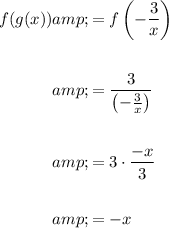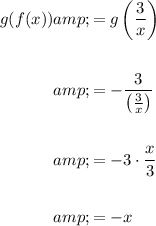Answer:


Explanation:
Part (a)
Given functions:

Evaluate the composite function f(g(x)):

Evaluate the composite function g(f(x)):

The definition of inverse functions states that two functions, f and g, are inverses of each other if and only if their compositions yield the identity function, i.e. f(g(x)) = g(f(x)) = x.
Therefore, as f(g(x)) = g(f(x)) = x, then f and g are inverses of each other.

Part (b)
Given functions:

Evaluate the composite function f(g(x)):

Evaluate the composite function g(f(x)):

The definition of inverse functions states that two functions, f and g, are inverses of each other if and only if their compositions yield the identity function, i.e. f(g(x)) = g(f(x)) = x.
Therefore, as f(g(x)) = g(f(x)) = -x, then f and g are not inverses of each other.